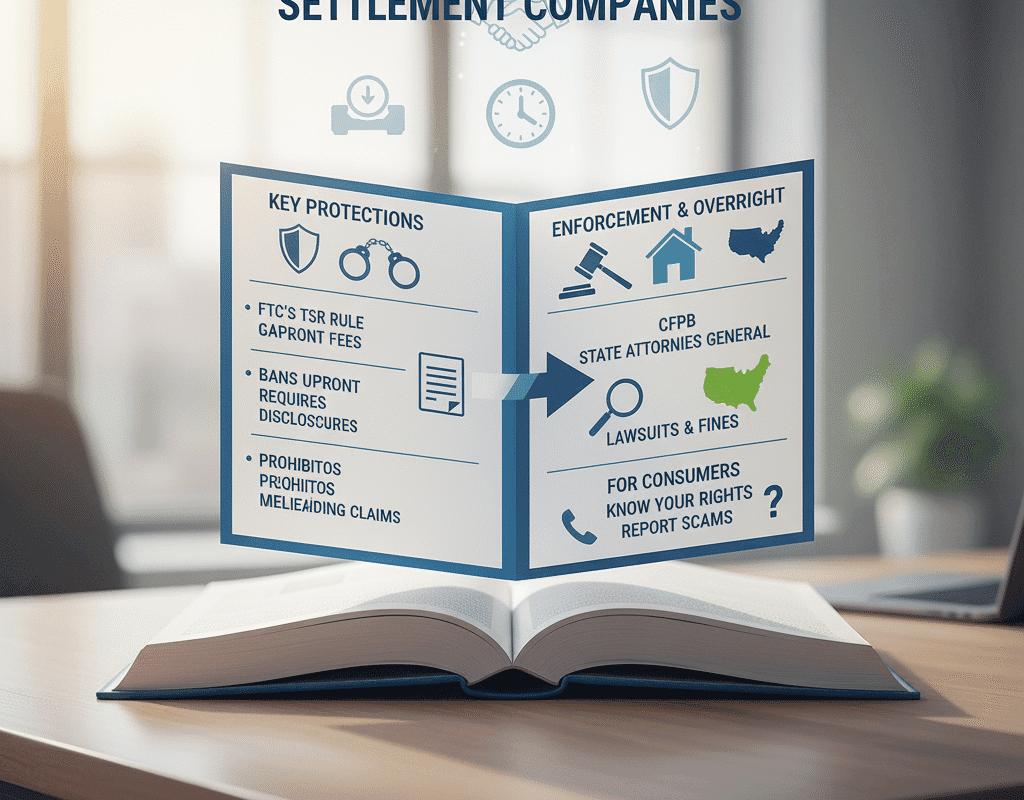How the U.S. Regulates Debt Settlement Companies?
How the U.S. Regulates Debt Settlement Companies?
As Americans struggle under mounting unsecured debt — credit cards, medical bills, personal loans — many turn to companies promising to negotiate or “settle” their debts for less than what’s owed. These are typically known as debt settlement companies (also called debt-relief or debt negotiating services). But how is this industry regulated in the United States? What safeguards exist to protect consumers and what rules must companies follow?
This article explains how the U.S. regulates debt settlement companies, at both the federal and state level, describes the key laws and regulatory agencies, outlines what to watch out for, and explores how consumers can protect themselves.
HSBC Cashback Credit Card 2025 – Benefits, Rewards & How to Apply?

A “Debt Settlement” Company: What Is It?
In order to lower the debt balance, interest rate, or terms of payment, a company that provides debt settlement services usually pledges to bargain with unsecured creditors (such credit cards or medical collections). The customer may be requested to suspend making payments to the creditor for a while and deposit money into a special account as part of a debt settlement plan.
Other debt-management services are not the same as debt settlement. A debt settlement company seeks to negotiate a lower payout, whereas a debt-management company aggregates payments and disburses them to creditors.
Due to the significant risk to customers and the possibility of unethical tactics, the debt settlement sector is vulnerable to
State Regulation: Consumer Protections, Disclosure, and Licensing
Since most debt settlement activities take place within states, state regulation of debt settlement firms is very important. Important aspects of state regulation frequently consist of:
Registering or licensing
- Before conducting business, a debt settlement service provider must register or receive a license from the state regulator in many states. For instance:
- The Maryland Debt Settlement Services Act mandates that providers register with the Commissioner of Financial Regulation of the state. It also imposes bond requirements, obligatory contract terms, and a ban on upfront fees until performance milestones are reached.
- Anyone providing debt settlement services to Californians as of February 15, 2025, is required to register under the California Consumer Financial Protection Law (CCFPL).
Contractual and transparency obligations
States usually require that consumer contracts include certain details, such as the services to be rendered, costs, schedule, cancellation rights, the provider’s inability to guarantee results, and the knowledge that the provider is not the creditor. Maryland, for instance, requires these disclosures.
Limitations on fees and surety bonds
- Prior to services being provided (for example, before a settlement is reached) or before the customer has made at least one debt payment under the plan, several states prohibit charging fees. According to Maryland law, fees are only allowed when certain milestones have been reached and are not allowed for consultations or credit report requests.
- Certain states mandate that providers maintain other financial precautions or file a surety bond to cover potential consumer losses.
The Regulatory Framework’s Operational Mechanism
Let’s go over the practical regulations governing debt settlement companies, what needs to be done to comply, and the hazards that customers still face.
Commencing activities
Depending on the jurisdiction, a company that wants to provide debt settlement services needs to:
- In the state or states in which it conducts business, register or acquire a license (usually through the state’s financial regulatory body).
- When utilizing telemarketing techniques (inbound or outbound calls), adhere to federal regulations like the TSR and refrain from charging advance costs.
- Make sure contracts don’t misrepresent success rates and contain required disclosures when requesting or mediating debt settlement.
Interacting with customers
When a customer enrolls in a debt settlement program:
- The provider must give a written contract that states the service, cost, timeline, risks, and that no guarantee of settlement exists. (Often required by state law)
- The consumer should be informed of possible negative consequences: worsening credit, lawsuits, tax implications (since some forgiven debt may be taxable) — though tax disclosures may not always be required federally, the provider should disclose major risks.
- Under the TSR, the provider cannot collect fees upfront before settling or reducing the debt. Only after performance milestones can fees be collected.
Dedicated bank account arrangements
Some companies ask consumers to stop paying creditors and instead deposit money into a special savings account intended to accumulate until a settlement offer is made. Regulators caution that such arrangements carry risk: while money is being amassed, fees may build, interest/penalties may accrue on the underlying debts, and creditors may sue.
Common Regulatory Pitfalls & Consumer Risks
Despite the regulatory framework, debt settlement remains a high‐risk option for many consumers. Key pitfalls include:
The lure of “reduce your debt dramatically”
Many debt settlement companies market aggressively, promising large reductions in unpaid balances or saying “we’ll make your debt go away”. Regulators warn that such promises are often unrealistic.
Encouragement to stop payments
Some providers advise the consumer to stop paying the creditors so they can “force” them to negotiate. While this may sometimes be part of a settlement strategy, it exposes the consumer to late fees, higher interest and lawsuits, and is flagged as risky by regulators.
Risks associated with dedicated savings accounts
Setting money away in a separate account under the provider’s instructions could result in the customer not making payments to the creditor, interest and penalties accruing, and fees or other costs reducing the settlement’s benefits.
Why Regulation Matters: The Consumer Perspective
Why should customers care about the regulatory environment of debt settlement companies? Since the organization’s level of regulation and the transparency of its services have a significant impact on the structure, cost, and risk of using a provider.
- A well-regulated provider is more likely to follow rules (no upfront fees, proper disclosures), reducing risk to the consumer.
- If something goes wrong (no settlement achieved, fees paid with no benefit, creditor suing) consumers are more likely to have recourse when the company is licensed and subject to enforcement.
- Consumers dealing with unlicensed firms or those operating in less-regulated states may have fewer protections and higher exposure to harm.
State and Federal Enforcement Trends
In recent years, there has been increased activity in the regulatory landscape pertaining to debt settlement firms. Some notable trends:
- In addition to the TSR and FTC‐actions, states have been increasing licensing and registration requirements, making it more costly for firms to operate and raising consumer protections.
- Regulators are focusing on marketing and disclosure practices, particularly around telemarketing, upfront fees, and misleading promises.
- Enforcement actions are common for firms that misrepresent their success rates, fail to negotiate, or charge fees not aligned with milestone performance.
- The consumer debt-relief industry more broadly is under increased scrutiny by the CFPB and FTC to protect consumers in financial distress.
The Role of Other Stakeholders: Creditors, Regulators & Consumers
Creditors
It’s important to recognise that creditors (banks, card issuers, medical‐bill providers) are not obligated to accept settlement offers. That means even with a debt settlement company working on your behalf, a creditor can refuse. This exposes the consumer to risk of collection efforts, lawsuits or wage garnishment.
Regulators (Federal & State)
Regulators monitor both the marketing/sales practices of debt settlement firms and their financial/licensing status. They respond to consumer complaints and may impose sanctions, fines, license revocations or bans. The FTC lists banned debt/mortgage relief providers.
Consumers
Consumers bear the ultimate risk when engaging a debt settlement provider. They must understand what they’re signing up for, the trade-offs, and do due diligence.
In conclusion: How the U.S. Regulates Debt Settlement Companies?
The regulation of debt settlement companies in the U.S. involves a layered framework: federal rules (notably the Telemarketing Sales Rule), state licensing/registration requirements, consumer disclosures, and enforcement actions by the FTC, CFPB and state regulators. While the regulatory environment has matured significantly, consumers must remain vigilant when engaging a debt settlement provider.
For those seriously considering debt settlement: understand the risks, ensure the provider is properly licensed and compliant, read the contracts carefully, and compare alternatives. Regulatory safeguards help, but they do not guarantee success. Ultimately, a well-informed decision is your best protection.
How the FDIC Decides Deposit Insurance Limits: Rules, History, and Impact on U.S. Banking
How the FDIC Decides Deposit Insurance Limits: Rules, History, and Impact on U.S. Banking
